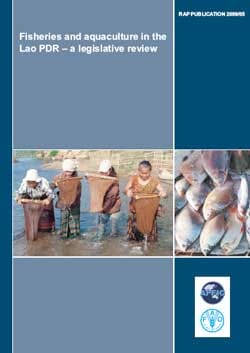The reviews concludes that the adoption of a framework fisheries and aquaculture legislation in Lao PDR will have the effect of clarifying the applicable legal principles for the conservation and management of fisheries and aquaculture, which, up to now, have been scattered over many laws and regulations.
This legislation is developed as a so-called 'enabling legislation' (as opposed to a 'prescriptive legislation') and allows for flexibility and adaptive management. This is an important feature in a country such as Lao PDR, which is endowed with abundant, diffuse and widely diverse fisheries and undergoing rapid change.

The proposed legislation is not a theoretical exercise nor overly top-down in its administration, as it promotes and recognizes management mechanisms that have already been tested in the country and are widely supported by local authorities and communities.
The implementation of the core principles of the law will be the responsibility of the FMCs and local authorities, to ensure that measures adopted at the local level are commensurate with local realities and practices and thus likely to be implemented.
An important effort was made to ensure wide participation and transparency at every stage in the drafting process in an attempt to build a large consensus on the core features underpinning the fisheries and aquaculture bill. It is fair to say that, in its current form, the fisheries and aquaculture bill reflects the results of the discussions with stakeholders. If, as expected, this framework legislation is adopted by the National Assembly at its first 2009 session, this will be a remarkable achievement and a good example of what a small but focused FAO project coupled to collaboration with relevant partners and stakeholders can accomplish.
The legislative practice in Lao PDR requires that any new framework legislation is submitted to National Assembly with its implementing regulations.
Attention should now turn on the preparation of regulations intended to facilitate the implementation of the fisheries and aquaculture law. In a previous report, the technical assistance identified the key regulations and guidelines to be drafted for the implementation of the law. They were the following:
- Contribution by the DLF to the lists of protected and managed species put together by the Forestry Department. Assessment of existing listing and identify the species of aquatic animals to be integrated in such lists. Assistance to the Forestry Department in determining a set of objective criteria to establish these lists (see Annex 2)
- Regulations providing for the list of species of aquatic organisms that can be farmed or released in Lao waters and the list of species of aquatic organisms that are banned for aquaculture or stock enhancement in these waters. These regulations should also lay down the process for adding or removing species from these lists
- Guidelines on the process for devising village fisheries regulations (see Annex 3)
- Guidelines for the establishment and operation of FMCs
- Regulation on prohibited fishing gears and methods (see Annex 4)
- Guidelines for the authorisation and regulation of fishery and aquaculture concessions.
It appears that the drafting of a regulation of general application listing prohibited fishing gears and methods is no longer necessary, as lists of prohibited fishing gears will be established locally by FMCs and village authorities through local regulations and management plans.
With respect to item c), it is strongly recommended that effort be made to devise a “positive” list of species of aquatic organisms (that is a list of species of aquatic organisms that are authorized to be farmed or released in Lao waters). The effect of this list will be to make the farming of any other species of aquatic organism an offence under the fisheries and aquaculture law.
The preparation of guidelines to assist village authorities in developing local regulations and management plans is critical to ensure effective management of local fisheries (item d). These guidelines should not only focus on the content and process for devising such regulations and plans, but also on the approval process and the role to be played by the fisheries administration through the DAFO and PAFO and by local authorities (district Heads and provincial Governor). It is suggested that DLF be associated with this initiative and that DLF endorses the final product. The goal is to avoid duplication of documents and thus potential for confusion by ensuring that only one set of guidelines of universal application be adopted and published. DLF in association with WWF have developed such guidelines and these are appended in (Annex 3).
As for the preparation of guidelines on the establishment and operation of FMCs (item e), it is recommended that both LARReC and MRC be associated to this task as both institutions have long-standing experience with the formation of fisher and user groups on water bodies.
Two other areas for the development of regulations have been identified. One is the preparation of a model fishing concession agreement designed to define key provisions that should be incorporated in all such agreements signed in Lao PDR. This would provide a 'minimum standard agreement' so as to avoid the conclusion of substandard agreements and consequent stakeholder conflicts or resource degradation as a result. The model fishing concession agreement would serve as a benchmark against which the fisheries administration would be able to assess the soundness of any proposed concession agreement. More stringent and additional provisions may be agreed upon by the parties to the agreement.
Another requirement is the preparation of a ministerial instruction directed at local authorities (Provincial Governors and district Heads) explaining the role to be played by these authorities in the process of approving the establishment of FMCs and local regulations and management plans.
Further Reading
| - | You can view the full report by clicking here. |
September 2009

